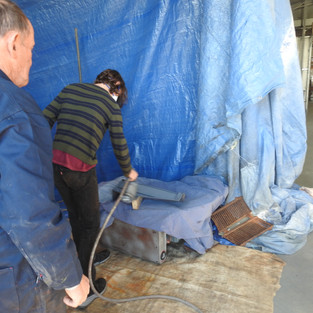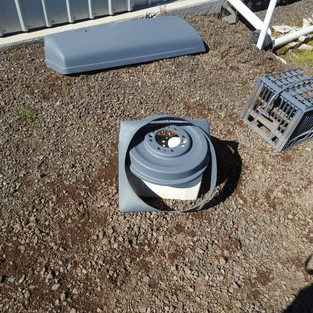Young People to fill the ranks
- Alan Denny
- Sep 6, 2018
- 4 min read
On August 29th & 30th the HFTCA hosted 13 students from Alice Miller School at Mt Macedon, Vic as the first step in what is planned to be a club wide project to involve young people in the restoration of Ferguson Tractors. Along the way it is hoped that this ‘hands on’ experience will educate them about the Ferguson System, teach those involved basic mechanical and restoration skills, and perhaps in the longer term attract younger members to the club. The tractors to be used for this project were donated by Neville (Nev) and Jenny Carter, along with a large number of new and used parts that Nev had collected for their restoration. It was this generous gift that got the committee thinking about making the best use of the tractors, with the idea of using them to involve youth in the club eventually coming together.
Prior to the commencement of the workshop the school had been visited on two occasions. On the first visit I outlined the restoration project being offered to the students and called for volunteers. It says a lot about the school that of total of about one-hundred and fifty students, forty-four volunteered on the spot. Enthusiasm and interest were high and extremely encouraging. A subsequent visit was made to the school to provide the students with an Occupational Health and Safety Briefing, and to run them through the tools that we would be using on the project. In discussions with the school it was decided that the students would not be using any power tools.
The team involved in putting the project together comprised Vernon Finlay, David Ralton, Lyndsay A’Vard and Noel Cox, Pauline Wilson and myself. Pauline, who teaches at Alice Miller co-ordinated the school’s input, sorting out dates, supervision, transport and food. The students would be sleeping overnight in the HFTC Heritage Shed at Lake Goldsmith under the supervision of two teachers from the school (Pauline being one of them). David, Vern, Lindsay and Noel worked out the timetable for the restoration, and they decided to set up three main work areas and divide the students in to teams of three or four, rotating each of the teams through the various stations so that all had a chance to have a go at all of the various tasks involved. From the outset we were all determined that the students would do all the tasks involved themselves, and our members would only provide instruction and guidance on how to do each task safely and efficiently. This worked very well, and I am delighted to say that we were able to keep to this process for the entire two days.
Vernon had a TEA engine set up on a stand and walked each group through is strip-down, explaining how it all worked and giving each student a chance to get stuck in. Once all students had done that, Vernon then assisted David with the strip-down process, guiding individual students through the disassembly of various components such as the steering box, distributor etc.
A pressure washer and cleaning rack were set up outside the shed and Noel guided the students through the initial clean-up of the tractor, using the washer, scrapers, wire brushes and lots of elbow grease. In the shed, David handled the strip-down of the tractor in a systematic way, with all parts removed placed in labelled containers and taken out to the cleaning station. After cleaning they were set aside for inspection, which took place during the last session of the workshop. The workshop area used for this process was well equipped with a wide range of tools, stands, jacks etc. generously donated to the club for this project by Lance Maskell and Queensland Tractor Spares. This very practical support to the project was a tremendous help in getting this project off the ground, so once again many thanks Lance.
Lyndsay had set up a temporary spray booth and paint preparation area in another corner of the shed. His background in panel beating was invaluable as he guided the students through the process of straightening panels, preparing components for paint, and using the spray gun. He set the system up so that as each student cleaned up a part, they followed it through to completion, thus seeing their finished product completely restored.
The two days were a fantastic experience for the club members involved, we were all in awe of the enthusiasm and interest shown by the students throughout the two days. The only problem we encountered was getting them to take a break – food seemed to be the only answer to that one. There was a real sense of joy in what they were achieving, and it was infectious. It was great to see their teachers drawn in to the process as well.
Despite a heavy frost and the temperature dropping to minus five overnight, there were no complaints and after a good breakfast they were all very keen to get cracking. Progress made over the two days far exceeded our expectations, and the kids are all keen to come to another workshop to keep working on ‘their’ tractor. At the conclusion of the workshop it was great to see them, on their own initiative clean and sweep the area and clean and put away all the tools. As organisers we all felt that these students are a credit to themselves, their parents and the school. They were focussed throughout, keenly interested and clearly all got on very well together. We can’t wait to get them back.






































































Comments